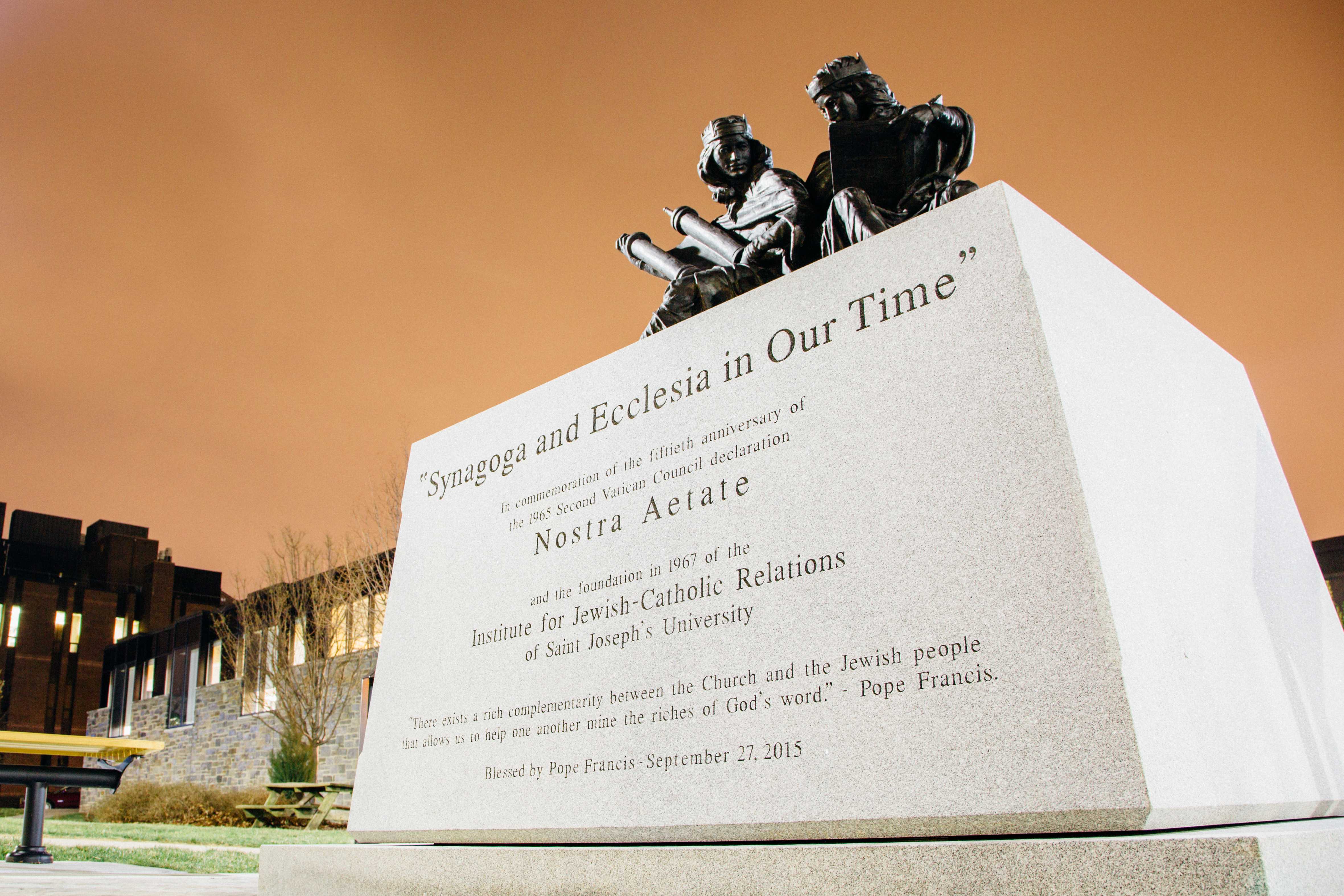St. Joe’s Institute for Jewish-Catholic Relations issues statement of solidarity
The string of vandalism and threats targeting Jewish institutions across the country has now reached Philadelphia.
Over the weekend of Feb. 25, close to 100 Jewish headstones were toppled in Mount Carmel Cemetery in Wissinoming, Pa. The vandals have not been found. Then, on Feb. 27, the Perelman Jewish Day School and the Kaiserman Jewish Community Center (JCC) in Wynnewood were forced to evacuate due to bomb threats.
“These events are especially shocking for many people because there’s appropriately a sense, for many American Jews, that this is a very tolerant society,” said Adam Gregerman, Ph.D., assistant professor of theology and religious studies and assistant director of the Institute for Jewish-Catholic Relations (IJCR). “There’s a sense of shock that outbursts like this happen. Fortunately, there are not broader patterns of anti-Semitism in American society in any mainstream way. It shakes people’s sense of comfort, it shake’s people’s sense of being at home.”
Saint Joseph’s University’s IJCR is the oldest organization dedicated to Jewish-Catholic relations in the country. For the first time in the history of the organization, the ICJR issued a statement of solidarity on Feb. 27 in reaction to the “horrific occurrences” taking place in local and national Jewish communities.
“We have never done this before,” said Phillip Cunningham, Ph.D., professor of theology and religious studies and director of the IJCR. “We’re not a political action entity; we do not advise on policy decisions. But because we’re friends with people, we react and respond to their emotional states.”
The IJCR’s statement, which was issued before the most recent bomb threats hit Philadelphia Jewish centers, highlights that the vandalism at Mount Carmel Cemetery left the Christian graves “unharmed, indicating a targeted assault on Jewish graves.” The statement also connects the vandalism with similar acts at Chesed Shel Emeth Society Cemetery in St. Louis, Mo. the week before.
The Anti-Defamation League (ADL) has also taken notice of the recent targeting of Jewish communities. It reports that there have been 90 threats against Jewish institutions since January 2017, and on Feb. 27, the ADL put out a security advisory to all Jewish institutions nationwide, stating that they should review bomb threat safety guidelines.

“It’s very upsetting and very disturbing,” said Rabbi David Ackerman, spiritual leader of Beth Am Israel in Penn Valley and member of the IJCR’s board. “And even if it turns out that these are adolescent prank acts, [it’s] still notable that its Jewish cemeteries that are singled out.”
Students at St. Joe’s shared similar reactions.
“As somebody that is Jewish at St. Joe’s, personally I felt almost victimized, in a sense, because of my background,” said Sarah Sowden, ’17. “I personally don’t understand why this particular group [those of Jewish faith] is strongly disliked when, to me, it’s just a religion. The values it represents are building character and building strong relationships. It was very shocking.”
While this pattern of incidents targeting local and national Jewish communities is disturbing, it is difficult to separate true hate from reckless threats.
“It’s hard to assess the significance of these events,” Gregerman said. “They’re clearly shocking, but they’re copycat crimes.”
The Washington Post reported that one man arrested for making threats against Jewish Community Centers was doing so in part to harass a Jewish woman he had once been involved with.
“Is that hate? Or is that just stupidity?” Cunningham said. “Nonetheless, it reawakens old fears in people whose families were traumatized, so in me, it causes a feeling of frustration.”
St. Joe’s students should be feeling concerned, as well, according to Rabbi Ackerman,
“It’s in your neighborhood,” Ackerman said. “The JCC is literally down the block from St. Joe’s. Haters tend to be equal opportunity sorts of folk. They don’t limit their hatred to just one group of people or one type of citizen or person.”
Sowden, too, would like to see more support for Jewish communities on campus.
“I think at St. Joe’s we should create more programs to highlight [the Jewish faith] and just create more openness about it and support it, because it is a group that is very small [on campus],” Sowden said.
Cunningham noted that numerous St. Joe’s students reached out to the IJCR after the Mount Carmel vandalism.
“We were contacted by students that we did not know who were concerned about the cemetery desecration and felt like they wanted to do something about it,” Cunningham said. He and Gregerman plan to meet with these students in the near future.
In the face of these troubling threats, Gregerman said that the mission and work of the IJCR is reassuring.
“The work of an institute like ours and other opportunities for people of different religious traditions to learn together and to study together undergird many of the changes that have occurred over the last half century,” Gregerman said. “The idea that Christians just, as a matter of course, speak out when there is an event like what’s happened in Philly—that shouldn’t be taken for granted. It’s the result of years of learning together and growing in trust.”





































